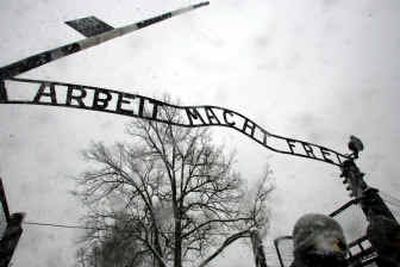Auschwitz anniversary holds modern lessons, historians say

OSWIECIM, Poland – Marian Turski was 18 when he arrived at the Auschwitz-Birkenau railway platform in summer 1944.
A member of an illegal political group in the Jewish ghetto of the central Polish city of Lodz, he had heard of the Nazi death camp’s existence on clandestine BBC radio broadcasts. But nothing prepared him for what lay before him.
It was before dawn, and the sun had not yet broken through the darkness. The chimneys spewed flames and smoke. At the platform, Nazis decided in seconds who was going to live – for a while – and who would be sent directly to the gas chambers.
Turski, considered fit for labor, was given a chance to live.
“It was a happy day,” said Turski, now 78, oblivious to how incongruous his words sound.
His father and brother were not as lucky. They and more than a million others died at Auschwitz between 1940 and 1945.
Today, leaders from dozens of nations, along with Auschwitz survivors and those who freed them, will gather in a solemn ceremony here to mark the 60th anniversary of the camp’s liberation by the Soviet army. They will ponder man’s capacity for evil, and renew pledges to make sure such acts never happen again.
With survivors such as Turski entering their twilight years, this year’s ceremony is one of the last occasions to bring together so many people to bear witness, said Auschwitz museum historian Franciszek Piper, whose office is one of the camp barracks.
“Without testimony there would be no knowledge, because documents don’t say much,” said Piper, who has worked 40 years at the museum recording witness accounts.
August Kowalczyk, 83, a Pole and retired actor, was sent to Auschwitz in 1940 at age 18. He escaped after a year and a half.
He returns to the camp each November with an international peace group and has visited more than 5,000 Polish schools to tell students about Nazi atrocities.
“I think that it is my obligation as a witness to pass the knowledge I kept in my memory,” said Kowalczyk, who will take part in today’s ceremonies at Auschwitz. “There is no other place in the world where so many hungry souls want us to remember them.”
Three former prisoners representing largest groups of victims – Jews, Poles and Gypsies – will open the commemoration ceremonies. Historians such as Piper hope the 60th anniversary will make Europeans more aware that although Auschwitz was mainly a Jewish experience, it clearly represented a crisis of European civilization.
As those who lived through the horrors of World War II die off, Piper and other historians say the need to educate a new generation has only grown.
Rene Felske, a student from Bernau, Germany, is the same age Turski and Kowalczyk were when they were sent to Auschwitz. On a school trip to the camp, Felske said it was hard to believe Germans were responsible for such horrors.
“Most young people don’t really know about it, or maybe they know but can’t imagine,” he said.
The Nazis opened the camp in summer 1940. It was initially intended to confine Polish opponents of Nazi dictator Adolf Hitler. Auschwitz was the German name given to Oswiecim.
In 1942, the camp was expanded and Birkenau, two miles away, was added. The camp’s focus shifted to Hitler’s “Final Solution,” an effort to exterminate the entire Jewish race. While most of those slain were Jews, some 75,000 non-Jewish Poles and 20,000 Gypsies also died here.
Today, Auschwitz is a popular stopover for tourists between Krakow and the mountain resort of Zakopane. For others, though, it is more than a side trip.
Tzvika Gross, a 31-year-old accountant from Israel, was visiting Auschwitz recently with his father and younger brother. More than 100 of their relatives, Hungarian Jews, lost their lives in the gas chambers of the camp.
Looking at a pile of inmates’ suitcases at the museum, they discovered one with the name Ella Neuman, possibly a relative on Gross’ grandmother’s side.
“This is really difficult for me,” Gross said. “I remember grandparents telling me horrible stories. The amount of blood shed here is like a wound that never heals.”
Recent visitor June Clarke, a 55-year-old British recruitment consultant from Yorkshire, emerged visibly shaken from the Auschwitz State Museum.
Looking at the infamous Arbeit Macht Frei (“Work Will Make You Free”) sign over the gate to the main Auschwitz camp, Clarke shook her head.
“They don’t give you a warning on how horrible it was,” she said. “We have to learn from it, never forget, and make sure it never happens again.”